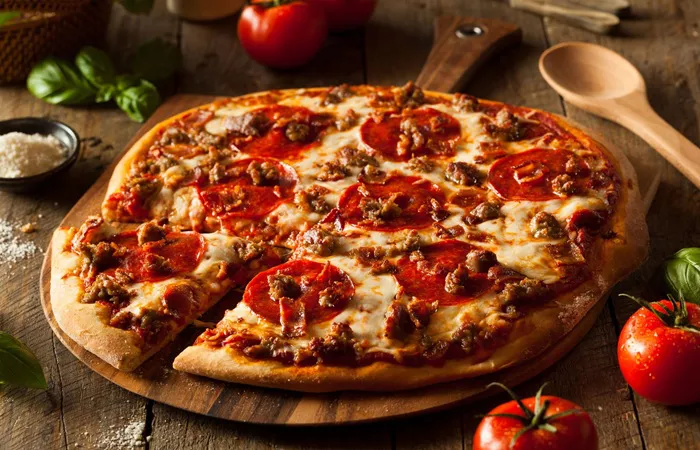Pizza is one of the most popular foods worldwide. Many people love its taste and convenience. It can be found everywhere-from fast food chains to homemade kitchens. Because of its popularity, some people wonder if eating pizza every day is healthy. This article will explain what happens when you eat pizza daily, the possible health risks, and how to enjoy pizza in a healthier way. We will use simple language to make the information easy to understand.
What Is Pizza Made Of?
Pizza usually consists of a dough base, tomato sauce, cheese, and various toppings. Common toppings include processed meats like pepperoni or sausage, vegetables, and extra cheese. The ingredients can vary widely, which affects the nutrition of the pizza. Some pizzas are made with refined white flour crusts and lots of cheese, while others use whole grain crusts and fresh vegetables.
Nutrition Profile of Pizza
Pizza is often high in calories, fat, saturated fat, and sodium. For example, a single slice can contain around 250 calories, 8 to 12 grams of fat, and over 500 mg of sodium. Some specialty pizzas have even higher amounts of calories and fat. Cheese and processed meats are the main sources of saturated fat and sodium in pizza. On the positive side, pizza can provide protein, calcium, and some vitamins like vitamin A and C, especially if it has vegetable toppings.
What Happens If You Eat Pizza Every Day?
Weight Gain and Obesity
Eating pizza daily can lead to consuming more calories than your body needs. Pizza is calorie-dense, meaning it has a lot of calories in a small portion. When you eat more calories than you burn, your body stores the extra energy as fat. Over time, this can cause weight gain and increase the risk of obesity. Obesity is linked to many health problems, including diabetes and heart disease.
Heart Health Risks
Pizza often contains high amounts of saturated fat and sodium. Saturated fat, found in cheese and processed meats, can raise your blood cholesterol levels. High cholesterol can cause plaque buildup in your arteries, increasing the risk of heart attacks and strokes. Sodium, or salt, can raise blood pressure by causing your body to retain water. High blood pressure strains your heart and blood vessels, increasing the chance of heart disease and stroke.
Nutritional Deficiencies
If pizza becomes your main food every day, you might miss out on important nutrients found in other foods. Fruits, vegetables, whole grains, and lean proteins provide vitamins, minerals, fiber, and antioxidants that pizza may lack. Without these nutrients, your body may suffer from deficiencies that affect your immune system, digestion, and overall health.
Digestive Problems
Most pizzas are low in fiber, especially those made with white flour crusts and few vegetables. Fiber is important for healthy digestion and regular bowel movements. A diet low in fiber can cause constipation and stomach discomfort. Eating pizza daily without enough fiber from other sources can lead to digestive issues.
Increased Risk of Type 2 Diabetes
Pizza contains refined carbohydrates from white flour crust and sometimes added sugars in the sauce. Eating too many refined carbs and sugars can cause your blood sugar levels to spike. Over time, this can lead to insulin resistance, a condition that increases the risk of developing type 2 diabetes.
How Often Should You Eat Pizza?
The key to enjoying pizza without harming your health is moderation. Experts recommend limiting pizza consumption to once or twice a week. This allows you to enjoy pizza’s taste and convenience while reducing health risks. Eating pizza occasionally, combined with a balanced diet, helps maintain good health.
How to Make Pizza Healthier
Choose Whole Grain Crusts
Whole grain crusts contain more fiber and nutrients than white flour crusts. Fiber helps digestion and keeps you feeling full longer.
Add Plenty of Vegetables
Vegetables like spinach, peppers, tomatoes, and mushrooms add vitamins, minerals, and fiber. They also add flavor and volume without many extra calories.
Limit High-Fat and Processed Meats
Instead of pepperoni or sausage, choose lean proteins such as grilled chicken or plant-based toppings like beans or tofu. This reduces saturated fat and sodium intake.
Use Less Cheese or Choose Low-Fat Cheese
Cheese is a major source of saturated fat in pizza. Using less cheese or low-fat cheese can lower the fat content.
Watch Portion Sizes
Eating one or two slices instead of a whole pizza helps control calorie intake. Pair pizza with a side salad to feel full and get extra nutrients.
Balancing Pizza with a Healthy Diet
Eating pizza every day is not recommended, but if you do, balance it with other meals rich in fruits, vegetables, whole grains, and lean proteins. Drink plenty of water and avoid sugary drinks. Physical activity also helps manage weight and heart health.
Conclusion
Eating pizza every day is generally not healthy. It can lead to weight gain, heart problems, nutritional deficiencies, digestive issues, and increased risk of diabetes. However, pizza can be part of a healthy diet if eaten in moderation and made with nutritious ingredients. Choose whole grain crusts, plenty of vegetables, lean proteins, and moderate cheese. Limit processed meats and control portion sizes. Remember, balance and variety in your diet are key to good health.
Enjoy pizza as a treat once or twice a week, and focus on a diverse diet rich in whole foods for the best health outcomes.
Related topics:


